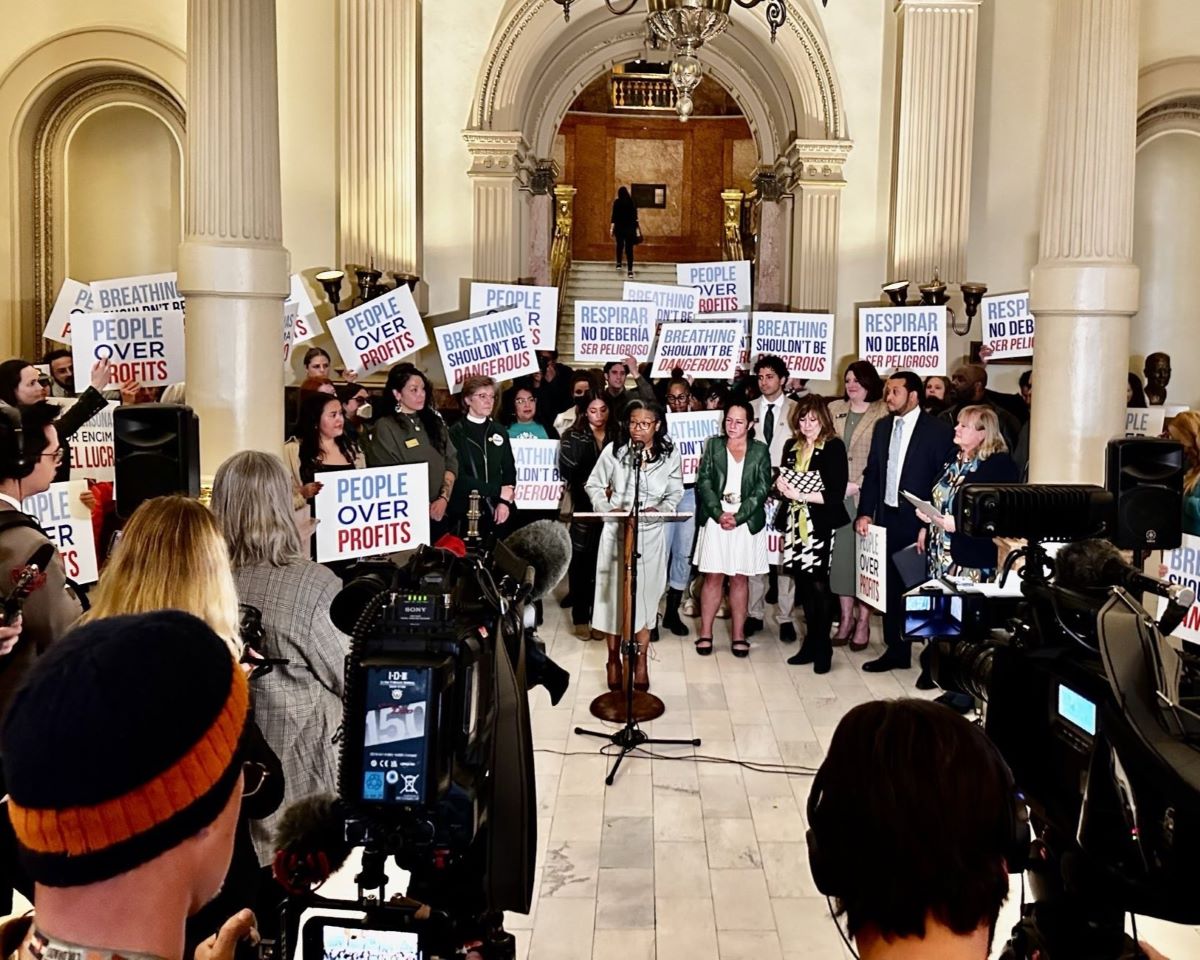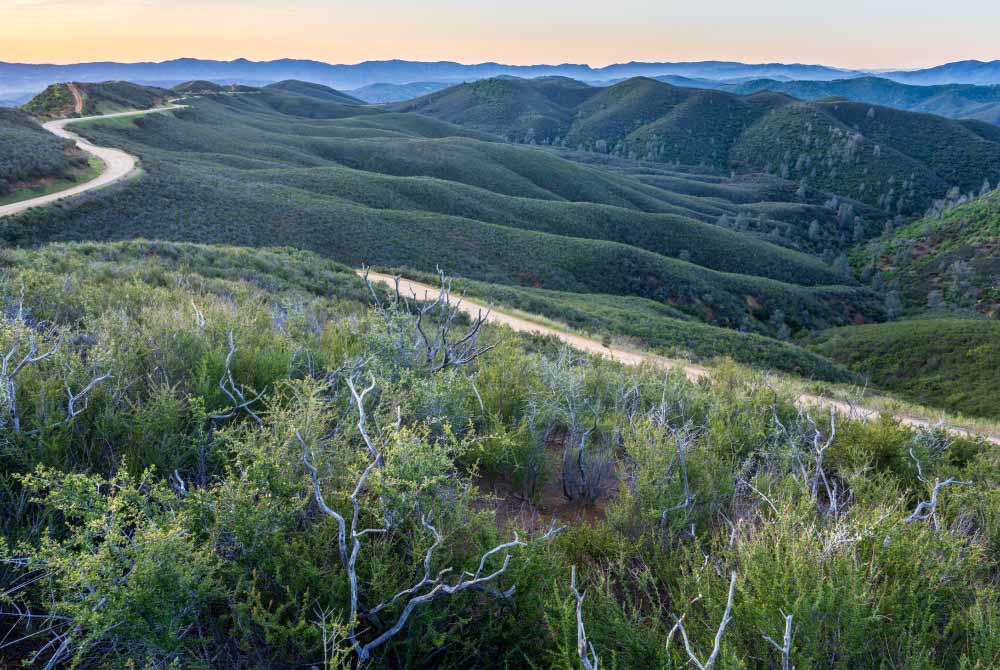
Good Climate News Roundup – 2024 Year in Review
Dec 20, 2024
Help LCV respond to threats to our communities and our climate in 2025 Give Now
 Berryessa Snow Mountain National Monument, California. Credit: Jesse Pluim, BLM
Berryessa Snow Mountain National Monument, California. Credit: Jesse Pluim, BLM
Each month, LCV shares five stories about the impact of our work. This month, we’re focusing on California’s latest clean energy milestone, state voting rights progress, a flurry of groundbreaking federal climate and environmental protections, the conservation of millions of acres of public lands, and recent LCV Action Fund congressional endorsements.
California — the world’s fifth-largest economy — ran its electric grid on 100% clean energy for up to six hours each day for a month spanning March and April. The state’s energy grid was powered 100% by clean and renewable sources, including wind and solar energy, for periods ranging from 15 minutes to six hours on each of those days.
This is just the latest in a series of clean energy accomplishments for the Golden State — which is ripe with potential for increasing its use of renewable energy sources:
In 2012, 12% of California’s electric sales came from renewable sources.
By 2022, the state’s use of renewables had increased to 36%.
To date, the state has only tapped 10% of its solar rooftop potential.
California could power over 25 million households with offshore wind energy alone.
This recent milestone is a huge win for the environment, public health, and consumers in California, who are seeing lower energy prices thanks to the increased use of renewable energy sources.
According to Johanna Neumann of Environment America, this achievement is just a hint of what the state is capable of. “California has the technical potential to meet all of its electricity needs 38 times over from solar alone,” she said.
LCV’s state affiliate, California Environmental Voters, has been deeply involved in furthering the state’s clean energy progress — organizing voters, helping to elect and train pro-environment candidates, holding elected officials accountable, and winning bold policies to drive climate action.
Reflecting on this milestone, California Environmental Voters Senior Political & Organizing Director Mike Young said, “As we celebrate California’s clean energy milestone, we’re reminded of the immense potential and urgency to scale up our clean energy initiatives. It underscores the feasibility of a greener future and the need for concerted action to end our fossil fuel dependency. California’s achievement is a stark reminder that we already have the solutions to solve the climate crisis. What we need is the political will necessary to meet this moment to create the cleaner future we deserve.”
From ballot initiatives to the leaders we elect, decisions affecting our health and environment begin at the ballot box. And yet, communities across the country are facing threats to democratic access. Since 2021, more than half of U.S. states have enacted laws that could limit voter access and inhibit the ability of officials to administer elections.
To counter these threats, LCV works to secure everyone’s right to have their voices heard in our democracy. This year, LCV and our 30+ state affiliates launched landmark legislative campaigns to advance state Voting Rights Acts while also supporting game-changing ballot measures that protect access to the polls. We’re making great gains across the country, including these recent victories:
In February, Maine Conservation Voters (MCV) hosted “Every Vote Equal: The National Popular Vote (NPV)” where Mainers and their legislators learned about the effort to move away from the Electoral College and toward electing the president based on the national popular vote.
Afterwards, MCV sent a recording of the event to legislators to persuade them to support the measure. One legislator responded by switching his vote to support NPV, contributing to its passage by a narrow three-vote margin. The bill is now officially signed into law, making Maine the 17th state to join the compact and moving the U.S. closer to electing presidents using the popular vote.
This year, Conservation Voters of New Mexico (CVNM) made advocating for pro-democracy legislation one of its key priorities, facilitating two critical wins that will make elections safer and more secure: SB 5, which creates penalties for carrying a firearm within 100 feet of a polling location in order to preempt voter intimidation tactics; and HB 182, which addresses artificial intelligence (AI) in election-related media to ensure that AI-generated or altered content is clearly disclosed to the public.
CVNM supported passage of this legislation by using social media outreach, garnering public testimony, and communicating with legislators about how they would be held accountable for their votes.
In a state where 94% of voters cast their ballots by mail, legislators introduced a dozen bills jeopardizing this process. These bills would have disproportionately impacted rural voters, some of whom would have faced a four-hour commute to their nearest polling location if the bills had passed.
LCV’s state affiliate, the Rural Utah Project, led partners in launching the Save Vote-By-Mail coalition petition campaign, which gathered thousands of signatures and led to public testimony and a postcard campaign to make sure the worst bills died in committee.
In February, staff from LCV’s state affiliate, Wisconsin Conservation Voters (WCV), joined Governor Evers in celebrating the signing of new fairer maps into law. The current gerrymandered legislature will now face the power of a robust democracy — including accountability, competition, and the freedom for constituents to choose their state representatives.
A combination of tactics by WCV — including advocating for fair courts, successful litigation around extreme gerrymandering, and garnering public pressure — all contributed to this victory. Read WCV’s take here.
As of May, LCV’s state affiliates have won more than 60 democracy-related policy victories across the country.
LCV and our state affiliates are innovating and working to protect people and the planet, and we saw a flurry of successes last month as the Biden-Harris administration announced environmental regulations and climate protections that will help safeguard our future:
Updated Onshore Oil and Gas Regulations — Cracks down on polluters and makes sure they pay their fair share for fossil fuels they extract from public lands.
Protections for 13 Million Acres of the Western Arctic — Maximizes protections supporting subsistence uses important to Alaska Native people and conserving important wildlife habitat for caribou and birds.
Designation of PFAS as Hazardous — Protects public health by making it easier to hold polluters accountable for cleaning up toxic PFAS contamination.
$7 Billion in Residential Solar Grants Announced — Provides residential solar power to 900,000+ households in low-income and disadvantaged communities, and avoids 30+ million metric tons of carbon pollution over the next 25 years.
Zero-Emission Freight Sector Goal Set — Couples a $1 billion federal investment with the nation’s first-ever goal to replace heavy-duty vehicles, including trucks and buses, with zero-emission alternatives.
Power Plant Rules Announced — Reduces carbon emissions from existing coal and new natural gas power plants, updates and strengthens the Mercury and Air Toxics Standards, cuts wastewater pollution, and implements new regulations on coal ash.
These are just some of many recent federal actions resulting from over a decade of organizing, advocacy, and electoral work by LCV, our state affiliates, and the larger environmental movement. Explore other recent federal actions that will protect public health, tackle climate change, and advance environmental justice.
With its most recent national monuments announcement, the Biden-Harris administration is now on track to conserve more land than any presidential administration in U.S. history.
The expansion of two California national monuments, San Gabriel Mountains and Berryessa Snow Mountain National Monuments, will provide communities with critical drinking water, increase access to green spaces for underserved communities, preserve areas of historical and cultural significance to California Tribes and Indigenous communities, and serve as wildlife corridors and habitats for imperiled animals and native plants.
The two expanded monuments are close to urban areas, adding to the many reasons that their preservation is critical:
LCV was among the organizations that joined forces to successfully advocate for the expansion of these California monuments. The broad-based coalition also included federal, state, and local leaders, Tribal governments, Indigenous communities, and other community-based and conservation organizations.
Related: Legislation calls for the designation of Chuckwalla National Monument.
LCV Action Fund works to elect pro-environment candidates who are committed to addressing the climate crisis and strengthening our democracy. LCV Action Fund recently announced additional 2024 U.S. House candidate endorsements, which include a mix of incumbents and first-time candidates:
In addition to endorsing these U.S. House candidates, LCV Action Fund also recently endorsed Andy Kim in New Jersey’s U.S. Senate race. U.S. Representative Kim has earned a 99% lifetime score on LCV’s National Environmental Scorecard due to his steadfast support for clean air, water, and energy during his time in Congress.
Since the 1990 election cycle, LCV Action Fund has helped elect and reelect 95 U.S. senators and 482 members of the U.S. House of Representatives. Over the last several years, our efforts have also helped elevate climate change and clean energy as critical issues in key elections. See who’s been endorsed by LCV Action Fund to date.
Related: LCV Action Fund-endorsed candidates win in recent primaries in Pennsylvania, Indiana, Maryland, and Nebraska.